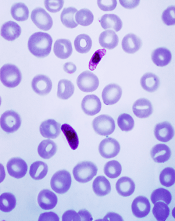User login

of Plasmodium falciparum
Image by Mae Melvin/CDC
New research indicates that drug-resistant forms of the malaria parasite Plasmodium falciparum can infect the Anopheles coluzzii mosquito (formerly Anopheles gambiae M form), which is the main transmitter of malaria in Africa.
The discovery suggests that Africa is more at risk for drug-resistant malaria infections than researchers previously thought, and this could further compromise efforts to prevent and eliminate the disease.
Rick Fairhurst, MD, PhD, of the National Institute of Allergy and Infectious Diseases in Rockville, Maryland, and his colleagues reported the discovery in Nature Communications.
The team noted that P falciparum parasites that are resistant to artemisinin, the main drug used to treat malaria, have been rapidly spreading in parts of Southeast Asia.
Malaria experts are concerned that artemisinin-resistant parasites could spread to Africa. However, there were no scientific indications to suggest these parasites could infect A coluzzii mosquitoes—until now.
Dr Fairhurst and his colleagues investigated the transmission potential of these parasites in 3 mosquito species—A coluzzii and the Southeast Asian mosquito species Anopheles dirus and Anopheles minimus.
The researchers evaluated whether these mosquitoes became infected after feeding on blood containing any of 6 artemisinin-resistant parasite strains and 3 artemisinin-sensitive parasite strains previously isolated from malaria patients in Cambodia.
The team found parasites in the mosquitoes’ midguts and salivary glands in almost all cases, showing that the artemisinin-resistant and artemisinin-sensitive Cambodian parasites can infect a variety of mosquito species.
The researchers also discovered a shared genetic background among artemisinin-resistant parasites that may enable them to infect diverse mosquito species by evading the insects’ immune systems.
This study did not show that infected mosquitoes can effectively transmit the disease to humans. However, the results support the idea that artemisinin-resistant parasites could potentially spread beyond Cambodia and to Africa, the researchers said.
They plan to investigate other potential genetic determinants of parasite infection in mosquitoes and further examine which Anopheles species from Cambodia are naturally transmitting artemisinin-resistant parasites in the wild. ![]()

of Plasmodium falciparum
Image by Mae Melvin/CDC
New research indicates that drug-resistant forms of the malaria parasite Plasmodium falciparum can infect the Anopheles coluzzii mosquito (formerly Anopheles gambiae M form), which is the main transmitter of malaria in Africa.
The discovery suggests that Africa is more at risk for drug-resistant malaria infections than researchers previously thought, and this could further compromise efforts to prevent and eliminate the disease.
Rick Fairhurst, MD, PhD, of the National Institute of Allergy and Infectious Diseases in Rockville, Maryland, and his colleagues reported the discovery in Nature Communications.
The team noted that P falciparum parasites that are resistant to artemisinin, the main drug used to treat malaria, have been rapidly spreading in parts of Southeast Asia.
Malaria experts are concerned that artemisinin-resistant parasites could spread to Africa. However, there were no scientific indications to suggest these parasites could infect A coluzzii mosquitoes—until now.
Dr Fairhurst and his colleagues investigated the transmission potential of these parasites in 3 mosquito species—A coluzzii and the Southeast Asian mosquito species Anopheles dirus and Anopheles minimus.
The researchers evaluated whether these mosquitoes became infected after feeding on blood containing any of 6 artemisinin-resistant parasite strains and 3 artemisinin-sensitive parasite strains previously isolated from malaria patients in Cambodia.
The team found parasites in the mosquitoes’ midguts and salivary glands in almost all cases, showing that the artemisinin-resistant and artemisinin-sensitive Cambodian parasites can infect a variety of mosquito species.
The researchers also discovered a shared genetic background among artemisinin-resistant parasites that may enable them to infect diverse mosquito species by evading the insects’ immune systems.
This study did not show that infected mosquitoes can effectively transmit the disease to humans. However, the results support the idea that artemisinin-resistant parasites could potentially spread beyond Cambodia and to Africa, the researchers said.
They plan to investigate other potential genetic determinants of parasite infection in mosquitoes and further examine which Anopheles species from Cambodia are naturally transmitting artemisinin-resistant parasites in the wild. ![]()

of Plasmodium falciparum
Image by Mae Melvin/CDC
New research indicates that drug-resistant forms of the malaria parasite Plasmodium falciparum can infect the Anopheles coluzzii mosquito (formerly Anopheles gambiae M form), which is the main transmitter of malaria in Africa.
The discovery suggests that Africa is more at risk for drug-resistant malaria infections than researchers previously thought, and this could further compromise efforts to prevent and eliminate the disease.
Rick Fairhurst, MD, PhD, of the National Institute of Allergy and Infectious Diseases in Rockville, Maryland, and his colleagues reported the discovery in Nature Communications.
The team noted that P falciparum parasites that are resistant to artemisinin, the main drug used to treat malaria, have been rapidly spreading in parts of Southeast Asia.
Malaria experts are concerned that artemisinin-resistant parasites could spread to Africa. However, there were no scientific indications to suggest these parasites could infect A coluzzii mosquitoes—until now.
Dr Fairhurst and his colleagues investigated the transmission potential of these parasites in 3 mosquito species—A coluzzii and the Southeast Asian mosquito species Anopheles dirus and Anopheles minimus.
The researchers evaluated whether these mosquitoes became infected after feeding on blood containing any of 6 artemisinin-resistant parasite strains and 3 artemisinin-sensitive parasite strains previously isolated from malaria patients in Cambodia.
The team found parasites in the mosquitoes’ midguts and salivary glands in almost all cases, showing that the artemisinin-resistant and artemisinin-sensitive Cambodian parasites can infect a variety of mosquito species.
The researchers also discovered a shared genetic background among artemisinin-resistant parasites that may enable them to infect diverse mosquito species by evading the insects’ immune systems.
This study did not show that infected mosquitoes can effectively transmit the disease to humans. However, the results support the idea that artemisinin-resistant parasites could potentially spread beyond Cambodia and to Africa, the researchers said.
They plan to investigate other potential genetic determinants of parasite infection in mosquitoes and further examine which Anopheles species from Cambodia are naturally transmitting artemisinin-resistant parasites in the wild. ![]()